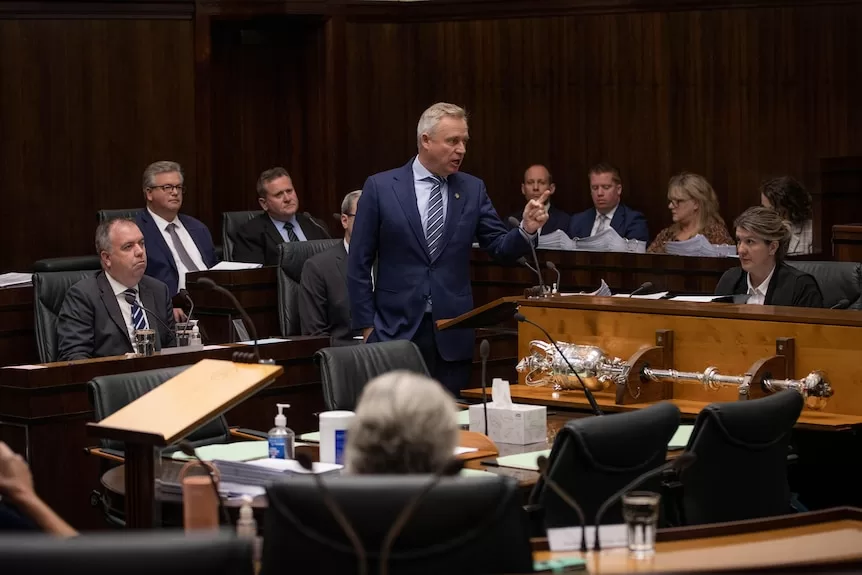Nina Rogers has always been engaged when it comes to politics — but it’s only this year that she’s decided to get active.
Ms Rogers is supporting a local independent candidate with not one, but two corflutes, in front of her home in Hobart.
Until recently, she has felt uninspired.
“I don’t trust in our politics and the way it is being delivered at this point in time,” she said.
“I believe in our institutions and I believe a vigorous democracy is incredibly important, but the focus on party politics is really off-putting,” she said.
“It’s not about a lack of concern or disinterest, but rather a cynicism about, well, can you trust government to deliver what they say they will, how will they do that?”
According to an Australia-wide survey at the last federal election, Tasmanians are not the only ones feeling a bit uninspired.
The Australian Election Study (AES) is a survey-based investigation of attitudes towards politics.
It has been conducted after each federal election since the late 1980s.
In 2022, only 30 per cent of respondents expressed trust in those in government and 54 per cent believed the government was run for “a few big interests”.
It also recorded a shift away from major party voting, at a state and federal level.
According to one of the report’s authors, senior lecturer in public policy at Griffith University, Sarah Cameron, Australians are becoming increasingly apathetic and disillusioned.
“We have seen satisfaction with democracy reach its lowest level in decades in recent years,” Dr Cameron said.
“It’s primarily driven by government performance.
“For example, the frequent changes in prime minister that we saw during the 2010s were a factor in undermining people’s attitudes towards government, but also other areas where Australians are getting the sense that the political class is more interested in their own concerns rather than governing on behalf [of their voters],” she said.
It has driven a surge in support for independent and minor party candidates, and an increase in “voter volatility” — voters being more likely to change who they vote for from election to election, and make up their minds closer to polling day.
What do people on the streets think?
But Dr Cameron said it did not mean Australians were uninterested or disengaged, rather they have fallen out of love with politicians.
“While Australians have become more distrustful of politicians and less satisfied with the way that democracy is working, they remain highly interested in politics,” she said.
“It’s about three in four Australians that say they’re interested in politics — and that has remained stable over time — and we’ve also seen that people do have the sense that who they vote for makes a difference, and that it’s important who is in power.”
To test this out, we took to the streets to conduct our own experiment.
We asked members of the public in central Hobart whether they recognised party leaders.
Out of about a dozen people, most knew there was a state election but could not recognise Jeremy Rockliff, Rebecca White or Rosalie Woodruff from their photo and could not name them.
Loading…
However, a small sample size of people solely in the Elizabeth Street Mall is likely not representative of the population as a whole.
Dr Hannah Murphy, a senior lecturer at the University of Tasmania’s School of Social Sciences, agreed with Dr Cameron when it came to the Tasmanian context: even though they are sick of the drama that has come with a minority government, frequent ministerial changes and disaffected MPs, Tasmanians are engaged.
“There are so many issues right now that touch almost everyone around Tasmania, from education to health to housing to public transport, so I think there wouldn’t be anyone in Tasmania who doesn’t interact with those policy areas,” Dr Murphy said.
She said this election may re-engage voters.
“The rise of the micro parties such as the Jacqui Lambie Network and independents disaffected from both sides of politics, Liberal and Labor, have the potential to re-engage … people who are sick of the major parties and the to and fro-ing between those two,” she said.
When asked whether he felt that people were turning away from major party politicians, Liberal leader Jeremy Rocklilff said it was not what he was hearing.
“What I’m hearing from the community is they want strong plans and they want very clear actions on their concerns. We have a 2030 strong plan for Tasmania’s future,” Mr Rockliff said.
Labor leader Rebecca White said it was clear the community wanted change.
“I do think that people are turning off the Liberal Party and I know that my job and our Labor team’s job between now and the 23rd of March is to convince people that if they want to change the government, they need to vote for Labor,” Ms White said.
LoadingLoading…
